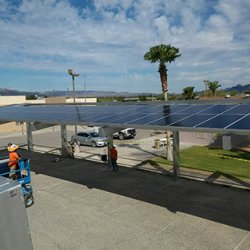A pioneering solar microgrid installed on The Chemeheuvi Reservation in Lake Havasu, California is at the leading edge of the state’s community resiliency efforts. The 90 kW carport system, the result of a partnership between The University of California, Riverside, The Chemeheuvi Tribe and GRID Alternatives with funding from the California Energy Commission, will provide a battery backed power source for the tribe’s community center, saving lives during grid outages and lowering the tribe’s energy costs.
High winds, bird strikes and the monsoon season all contribute to frequent power failures in this exposed region of the Mohave Desert. “On occasion, power will be out for up to three days, which is concerning especially for community members with medical conditions or tribal elders.” explained Chemehuevi Vice-Chairman Glenn Lodge. Low-income and elderly residents come to the center, previously powered by a diesel generator, for a place to sleep and shower, power their medical devices, or just stay cool during summer blackouts.
“We expect a financial impact as well,” said Vice Chairman Lodge. “Cost savings from reduced electricity usage will be applied to other housing and community projects that help members who need it most.”
This project is part of a larger effort by the tribe to increase energy independence, lower costs, and improve quality of life for its residents. GRID has also installed over 80 residential systems on Chemehuevi homes to-date, and trained 20 members in solar installation. The project, catalyzed by a state funding opportunity through the CEC, will serve as a model for other tribes and communities looking to improve their resiliency in the face of both ordinary outages and emergency situations like fires and natural disasters. The CEC, through its EPIC program is committed to investing $44 million in additional microgrid projects in 2018, with a focus on tribal and disadvantaged communities.
Check out the short clip to see the completed carport microgrid and consider donating to our Tribal Program to bring more projects like these into Native American lands.

